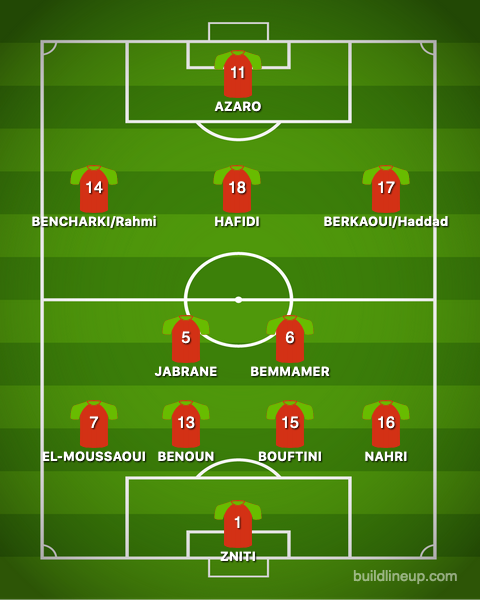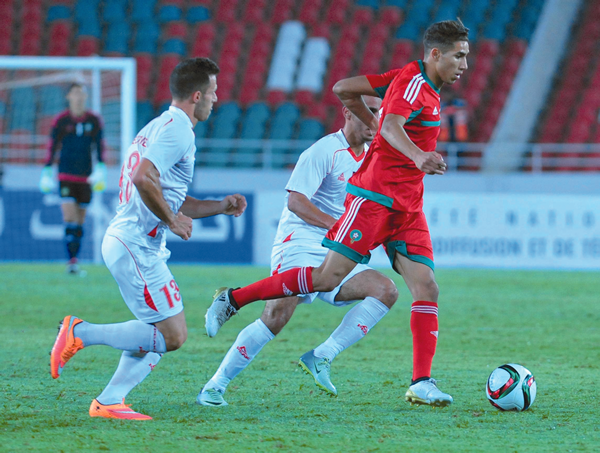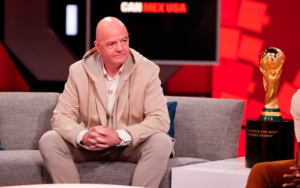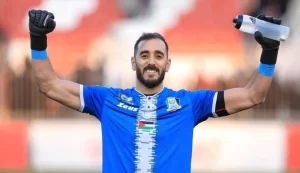What: 2021 FIFA Arab Cup
When: December 1, 2021
Where: Al-Janoub Stadium, Al-Wakrah, Qatar
Kickoff: 18:00 Jerusalem
Streams/TV: Streamed live on our site, also available on FIFATV, beIN Sports & Al-Kass (MENA)
Previous Encounters
07.10.1976 | Palestine 0:3 Morocco | 1976 Pan Arab Games (unofficial)
20.12.2002 | Palestine 1:3 Morocco | 2002 Arab Cup (unofficial)
14.11.2016 | Palestine 0:0 Morocco | Friendly (unofficial)
Absences Abound
Palestine vs. Morocco will be one of the biggest mismatches at the FIFA Arab Cup. A total of 70 spots separate the 28th ranked Atlas Lions and the 98th ranked Al-Fida’i. Only Sudan’s games vs. Algeria and Egypt and Tunisia vs. Mauritania will feature a bigger gap in terms of the FIFA ranking of the respective sides.
Palestine have faced Morocco three times before and in the two more recent occasions played a team closer to Morocco A’ (a team made of local players that compete in the CHAN, the Championship of African Nations) than the Morocco side that draws on talent from Chelsea, PSG, Sevilla, and other top level European clubs.
Morocco’s 23 man squad at the FIFA Arab Cup might not look anything like the team that propelled Morocco up the FIFA rankings and to the precipice of a second consecutive FIFA World Cup finals appearance- but make no mistake- this Morocco side is amongst the most talented sides at the FIFA Arab Cup.
Morocco’s local side has won the last two CHAN Titles and the mastermind behind those achievements- manager Hussein Ammouta- will lead Morocco in Qatar as the Atlas Lions look to win back-to-back Arab Cup titles. In his squad he can count on nine veterans of the 2020 CHAN campaign- including the tournament’s best goalkeeper Anas Zniti, the tournament’s MVP and top scorer Soufiane Rahimi in addition to Soufiane Bouftini, Hamza El Moussaoui, Mohammed Ali Bemmamer, and Yahya Jabrane, who started all six matches in that title run.
On the other side Palestine are contending with a slew of absences. This past weekend saw Saleh Chihadeh, Muhamed Alghoul, Oday Dabbagh, and Mahmoud Wadi all score and lead their side to victory. The quartet were all part of Palestine’s initial 35-man squad but were denied a chance to participate at this tournament by their clubs.
Palestine’s stalwart at left back, Abdallah Jaber, is unavailable as well due to club commitments with Sakhnin although an ongoing feud with the PFA might have ruled him out anyway.
Other than Oday Dabbagh, Makram Dabboub’s side features all the starters that delivered a trio of victories in June to end World Cup qualifying and a 5-1 dismantling of Comoros in the playoff phase. Boosting those ranks are goalkeeper Amr Kaddoura and winger Mahmoud Eid. The presence of the country’s top defenders (Abdelatif Bahdari, Yaser Hamed Mayor, & Mohammed Saleh) in addition to the full compliment of midfielders should allow Palestine to formulate a game plan to neutralize the Moroccan attack.
Looking back to 2016
The lack of regular matches between Palestine and Morocco and the fact that the two compete in separate continental competitions makes analyzing this encounter very difficult.
On reputation, Morocco is a stronger side than Palestine and if this was Morocco’s first team, Palestine would have almost no chance of getting a result. As this is not the case, Palestine has a better chance of securing a result, even if most prognosticators have dismissed their chances entirely.
There is one recent match that might shed some light as to how Palestine will approach this game. Back in 2016, Palestine played Morocco in an unofficial friendly and although that side was dismissed as a U23 team or an experimental featuring players with no hopes of ever playing for the the first team that was actually far from the case.
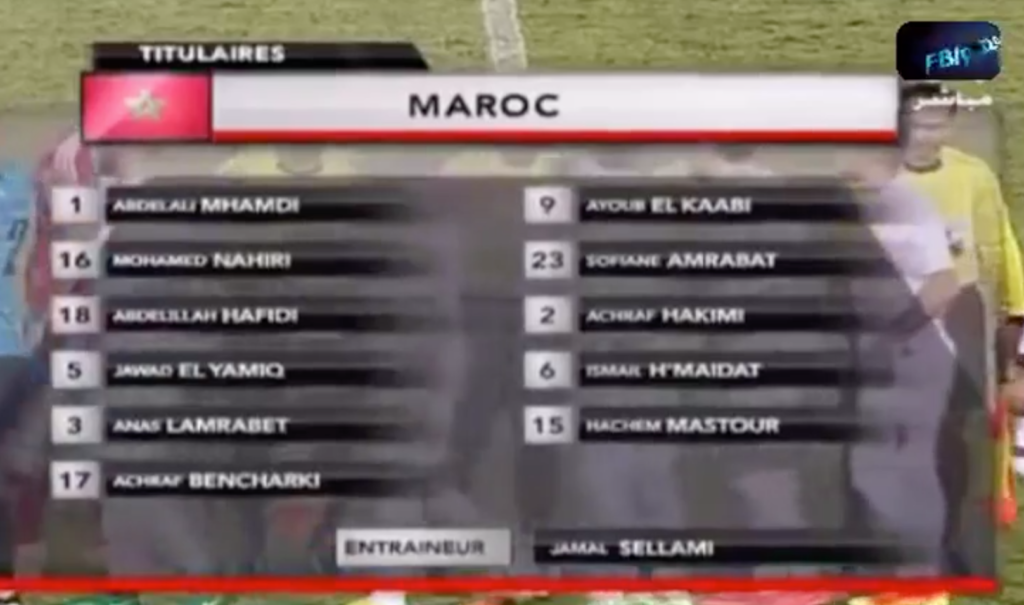
As seen in the image above there are several players that are now mainstays in the Morocco first team. Achraf Hakimi is perhaps the best right back in the world, Jawad El Yamiq is one of Real Valladolid’s best players, Sofiane Amrabat plays for Fiorentina and plays regularly for the national team. Ayoub El Kaabi was a star in back-to-back CHAN winning campaigns and a member of the 2018 FIFA World Cup squad.
There are of course players who won’t face Palestine on Wednesday that have not reached the dazzingly heights of their teammates: Anas Lamrabet is playing in the lower reaches of Moroccan football, Ismail H’maidat plays for Como in Serie B, and are Ismail H’maidat (Como/ Serie B), and the once highly touted Hachem Mastour, who was on the books of AC Milan but is now without a club.
The rest of the side? Many of them could feature against Palestine five years after this overlooked friendly goalkeeper Abdelali Mhamdi, Achraf Bencharki, Mohammed Nahiri and Abdelilah Hafidi are all part of Morocco’s Arab Cup squad.
It is also worth noting that Palestine held their own in this encounter and came away with a 0-0 draw. Factor in the experience many of these players got in the Arab Club Championship tie when Hilal Al-Quds played Raja Casablanca in 2019 as well as Tamer Seyam’s two year stint in the Moroccan top flight with HUSA Agadir and you can start to envision a scenario in which Palestine could get a result.
How will they lineup?
The big question is whether or not Palestine will depart from Makram Dabboub’s favored style of play against the strongest team in the group. Under the stewardship of the Tunisian, Palestine have become an aggressive pressing team deployed in the 4-3-3 shape. The vast majority of goals under Dabboub scored are a direct result of winning the ball in the opponent’s half and commanding the front three to find the quickest route to goal. The other source of goals? Set pieces.
Five out of fourteen goals have come as result of penalties (2), free kicks (1), or corner kicks (2).
A defensive line featuring three centre backs (Mohammed Saleh, Abdelatif Bahdari, Yaser Hamed Mayor) was something Palestine implemented in their last match against Bangladesh and although that was done in a primarily attacking context, Palestine played in a 3-4-3 formation that day, it seems plausible that Dabboub could choose to deploy it against Morocco. Even if it isn’t used from the start, the three man back line could feature late on in the match should Palestine be fortunate enough to be defending a result with less than half an hour to go. (For more on how Palestine could lineup, click here).
Hussein Amoutta’s men will have the benefit of a certain degree of familiarity with the manager and his preferred 4-2-3-1 formation. The backline is almost certain to feature veterans Mohammed Nahiri at right back and Al-Ahly’s Badr Benoun at centre back in tandem with Bouftini and El-Moussaoui who started every game for Amoutta at the 2020 CHAN. Yahya Jabrane and Mohammed Ali Bemammer also CHAN 2020 veterans, will play as the double pivot while Abdelilah Hafidi will pull the strings as the #10.
The attack is more of a mystery, as Morocco can no longer count on the services of Turkey based Ayoub El-Kaabi. That said, there are no shortage of options with Zamalek’s Achraf Bencharki and Karim El-Berkaoui (Raed/KSA) and former Al-Ahly striker Walid Azaro all available for selection.
